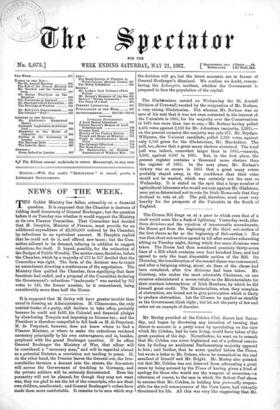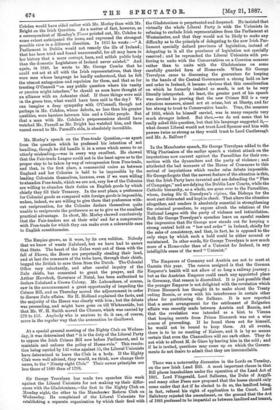Mr. Morley presided at the Cobden Club dinner last Satur-
day, and began by disowning any intention of turning that dinner to account in a party sense by speculating on the view which Mr. Cobden, had he been living, would have taken of the great question of the day. Nevertheless, he went on to remark that Mr. Cobden was never frightened out of a political convic- tion by finding an accidental Parliamentary majority opposed. to him; and further, that he never quailed before the Times, but wrote a letter to Mr. Delano, whom he unmasked as the real assailant of himself and Mr. Bright. Mr. Morley also pointed out that Mr. Cobden was not deterred from advocating a great cause by being accused by the Times of having given a kind of apology for those who would use the weapons of assassins,—a reference, of course, to the case in which Sir Robert Peel chose to assume that Mr. Cobden, in holding him personally reopen- Bible for the evil consequences of the Corn Laws, had virtually threatened his life. AU this was very like suggesting that Mr. Cobden would have sided rather with Mr. Morley than with Mr. Bright on the Irish Question. As a matter of fact, however, as a correspondent of Monday's Times pointed out, Mr. Cobden to some extent anticipated the issue, and expressed the strongest possible view in a different direction. In 1835 he wrote :—" A Parliament in Dublin would not remedy the ills of Ireland ; that has been tried and found unsuccessful, for all may learn in her history that a more corrupt, base, and selfish public body than the domestic Legislature of Ireland never existed." And again, in 1848, he wrote to Mr. George Combe that he could not act at all with the Irish representatives, that. they were men whose language he hardly understood, that he felt the utmost antagonism and repulsion for them, and that as for trusting O'Connell " on any public question where his vanity or passion might interfere," be should as soon have thought of an alliance with an Ashantee chief. If these things were said in the green tree, what would have been said in the dry ? We can imagine a deep sympathy with O'Connell, though not perhaps in Mr. Cobden, whose defects, no less than his greater qualities, were barriers between him and a Celtic people. But that a man with Mr. Cobden's prepossessions should have watched Mr. Parnell as Mr. Bright has watched him, and then veered round to Mr. Pullen side, is absolutely incredible.



















































 Previous page
Previous page